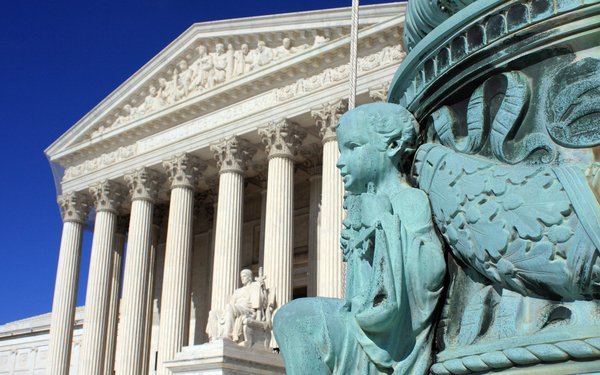
The Supreme Court on Thursday unanimously ruled that
terror victims can't proceed with a lawsuit claiming that social media companies aided and abetted attacks by allegedly failing to remove terrorists' posts.
In opinion issued by Justice
Clarence Thomas, the court said that failing to take down posts by terrorists isn't the kind of intentional assistance that would establish liability for aiding and abetting terrorism.
“There is no allegation that the platforms here do more than transmit information by billions of people, most of whom use the platforms for interactions that once took place via mail, on
the phone, or in public areas,” Thomas wrote. “The fact that some bad actors took advantage of these platforms is insufficient to state a claim that defendants knowingly gave
substantial assistance and thereby aided and abetted those wrongdoers’ acts.”
advertisement
advertisement
The ruling reversed a decision issued by the 9th Circuit Court of Appeals, which said victims of a
January 2017 Islamic State attack at the Reina nightclub in Istanbul could proceed with a claim that the companies violated the Anti-Terrorism Act.
That law enables people harmed by
international terrorism to sue anyone who knowingly provides substantial assistance to foreign terrorist organizations.
The family's theory was that the social media companies assisted
terrorists by failing to take down their posts and, in some cases, recommending terrorists' posts to other users.
U.S. District Court Judged Edward Chen in the Northern District of
California dismissed the lawsuit on the grounds that the allegations, even if proven true, wouldn't show the companies violated the Anti-Terrorism Act.
The family appealed to the 9th Circuit
Court of Appeals, which reinstated the claims, writing that the complaint's allegations, if true, could prove that the platforms aided and abetted terrorism.
The tech companies then appealed
to the Supreme Court, arguing that failing to police the use of “routine services” that are available to the public isn't aiding and abetting terrorism.
The Supreme Court agreed
with the tech companies.
“As alleged by plaintiffs, defendants designed virtual platforms and knowingly failed to do 'enough' to remove ISIS-affiliated users and ISIS-related
content -- out of hundreds of millions of users worldwide and an immense ocean of content -- from their platforms,” Thomas wrote. “Yet, plaintiffs have failed to allege that
defendants intentionally provided any substantial aid to the Reina attack or otherwise consciously participated in the Reina attack -- much less that defendants so pervasively and
systemically assisted ISIS as to render them liable for every ISIS attack.”
Thomas also wrote that even if the companies used algorithms to recommend terrorist videos, those
recommendations didn't constitute aiding and abetting terrorism.
“The algorithms appear agnostic as to the nature of the content, matching any content (including ISIS’ content)
with any user who is more likely to view that content,” he wrote. “The fact that these algorithms matched some ISIS content with some users thus does not convert defendants’ passive
assistance into active abetting.”
The matter was one of two cases to come before the Supreme Court this year regarding tech companies' liability for terrorism. The other case centered on
Google's potential liability for allegedly recommending videos posted by ISIS members.
That case was brought by the family of Nohemi Gonzalez, a California State University student who was
killed in a terror attack in Paris.
Google argued it was protected by Section 230 of the Communications Decency Act, which shields companies from lawsuits over material posted by third
parties.
The 9th Circuit sided with Google in that matter, ruling that Section 230 of the Communications Act immunizes Google from liability for users' content, as well as for recommending
users' posts.
The family then appealed to the Supreme Court, arguing that Section 230 shouldn't protect companies over their recommendations.
The Supreme Court dodged that question
Thursday. Instead, the court sent the lawsuit back to the 9th Circuit, but indicated that the matter should be dismissed for the same reasons as the lawsuit over the Reina attack.